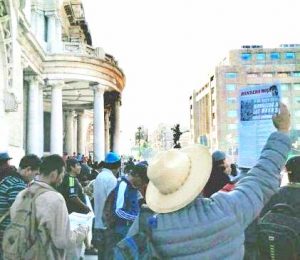
May Day, 2019, Mexico City
The government of López Obrador (AMLO) carries banners with capitalist slogans like the internal market, sovereignty, the regulation of investment to prevent bribes. He promotes “acceptable” capitalism for the “population” by distributing crumbs to the workers. Some polls find approval of the government “among the population” to be over 80%.
There is little talk about how AMLO’s way of governing fits into the dispute among imperialists.
The great powers are dividing up the world: the markets, the sources of raw materials and above all the workers’ labor power. AMLO’s government is involved in this fight. It tries not to declare itself openly on the Chinese-Russian side. However, it takes advantage of the dispute. It continues the policy of its predecessors: “public-private” investment, militarization of the country, austerity for the workers.
AMLO’s detractors accuse him of scaring off foreign investment. The rating agencies (Ficht, Moody’s, Standard & Poor’s) attacked his plan to have Pemex build an oil refinery in Dos Bocas, Tabasco. He got away with it by first guaranteeing the debt repayment on the established terms.
The value of the peso continues fluctuating but has not returned to 20 per dollar.
Capitalism is still in control under AMLO’s “fourth transformation.” It’s behind the controversial “Mayan train,” a project to build a rail line running 1500 kilometers through southern Mexico. Coffee production is taken over by large corporations: “If they want the economy to grow by 4%, Nestlé, go!”
Foreign investment will be respected. It will have guarantees. The bourgeoisie in Mexico still does the major part of its business with U.S. capitalists. However, it continues to diversify its investors and business partners. European investment has grown faster that of the U.S. capitalists. So has that of Asian capitalists: Japan, Korea and lately China. Huawei is one example.
European Union and U.S. capitalists are fighting over US sanctions on European companies investing in Cuba. Mexican and other capitalists will surely fight for a larger share of the profit pie with their U.S. partners.
Carlos Slim himself (owner of América Móvil) will expand his business in the U.S. and in Cuba. Cemex, the Zambrano family’s international cement company, may try again in Cuba if the threat of sanctions is overcome.
The workers gain nothing by supporting one or the other capitalist side. We need to free ourselves from all of them. We need to constitute ourselves as a class. Building the ICWP will be the process where we will forge the conditions of our emancipation.
There were 15 federal strikes in the first quarter of this year at factories, government institutions, supermarkets and universities. The Communist movement was not a factor in these struggles.
We have a long way to go to achieve the mobilization of the masses for Communism.
In our last meeting we saw the need for a strategy to achieve greater unity among active members, to study our line rigorously, and to recruit new members. All this to be able to better respond to the conditions generated by AMLO’s government, the capitalist crisis, and the inter-imperialist rivalry in this part of the world.


